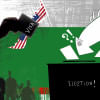Bangladesh in geopolitics: Post-election challenges

In the international fora, this election, firstly, impacts the reputation of Bangladesh. Even preceding the election results, over the last two to three weeks, the international media has not been branding Bangladesh in a positive way. Many nations have reiterated for a while that Bangladesh must hold free and fair elections. The United Nations echoed that a free and fair election was the desirable option for Bangladesh, and now they have stated that it has not been free and fair. It will, therefore, be a challenge to persuade international observers to somehow accept whatever we have done. Providing them with appropriate answers is perhaps the only option to recover our reputation. Bangladesh's reputation as a democratic country has come under a big question, and that question will continue to vibrate and challenge us in the coming months, and years also.
The kind of relationship that we have with the international community is multi-dimensional and layered. The economic and social development that Bangladesh has achieved so far is closely related to our partnership with development partners. Our export earnings are also linked to our external partners and trade ties. Currently, our exports are slowing down, there is a dollar crisis, and imports are also under pressure.
To add to that, Bangladesh is planning to go into the LDC graduation process in 2026—which means we have to create our own space in the international community as many of the unilateral concessions that the country has been enjoying over the decades will go away. We will soon have to renegotiate many agreements for trade, loans and development assistance. Implementing reforms within our internal structure to align it with external expectations will prove to be quite a challenge.
The European Union has indicated that the democratic credentials of Bangladesh will be an important factor for sustaining and furthering the existing trade. The lingering issues in Bangladesh, such as human rights, curbing press freedom and civic activism and so forth, will vibrate while we try to negotiate with our partners, particularly the EU, the United States, and the International Labour Organization (ILO).
The fact of the matter is, we need all of our partners. Our remittance from the Middle East and the US is an important pillar for our economy. For the last few months, we have been seeing that the money has not been sent through the formal channel. Trading is also another example of our interdependence on our partners. We import from both China and India, add value here in Bangladesh, and send it to Europe and the US. If one of these pillars is affected negatively, then the whole structure would be affected as well.
Challenges also await Bangladesh in geopolitics with tension rising in the Indo-Pacific region, specifically with India and China. The US and China are also great powers involved in Bangladesh. Seemingly, all of them want to sustain Bangladesh on their side now. However, there have been speculations that we are getting closer to China for obvious reasons, because we need their support for our infrastructure development and economic development.
Now, we are going into a kind of zero-sum approach, and how we are going to handle that in the coming months and years remains to be seen. The fact of the matter is, we need all of our partners. Our remittance from the Middle East and the US is an important pillar for our economy. For the last few months, we have been seeing that the money has not been sent through the formal channel. Trading is also another example of our interdependence on our partners. We import from both China and India, add value here in Bangladesh, and send it to Europe and the US. If one of these pillars is affected negatively, then the whole structure would be affected as well.
Bangladesh has to maintain a balanced relationship with all five major centres: China, India, the US, EU and Japan, from a trade point of view. If confidence in the economic and democratic institutions is not rebuilt in the next few months and years, then maintaining Bangladesh's non-aligned geopolitical standing in the tug of war between the great powers with diverging interests will become increasingly difficult.
M Humayun Kabir is a former Bangladeshi diplomat.
Views expressed in this article are the author's own.
Follow The Daily Star Opinion on Facebook for the latest opinions, commentaries and analyses by experts and professionals. To contribute your article or letter to The Daily Star Opinion, see our guidelines for submission.

 For all latest news, follow The Daily Star's Google News channel.
For all latest news, follow The Daily Star's Google News channel. 









Comments